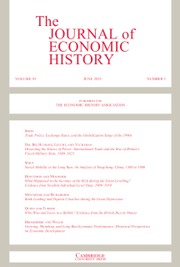-
作者:Providence College
摘要:This article argues that the banking crises and collapse of the international gold standard in the early 1930s contributed to the severity of the Great Depression by increasing interest-rate uncertainty. Two pieces of evidence support this conclusion. First, uncertainty (as measured by the risk premium embedded in the term structure of interest rates) rises during the banking crises and is positively linked to financial-market volatilty associated with the breakdown in the gold standard. Secon...
-
作者:STOTT, R
-
作者:GEORGE, P
-
作者:Columbia University
摘要:By surveying contemporary sources this article reveals direct evidence for the involvement of the South Sea Company in the passage of the Bubble Act. The dominant position of the Company and of its national debt conversion scheme in the affairs of England in 1720 support the conclusion that the act was in fact a piece of special-interest legislation for the Company. The short-term interest that motivated the enactment, together with the limited legal and economic effects of the act, minimized ...
-
作者:MASON, JR
-
作者:CIZAKCA, M
-
作者:GREIF, A
摘要:Although the late medieval Commercial Revolution is considered to be a water-shed in the economic history of Europe, the analysis of the interrelationship between political and economic systems in bringing about this period of economic growth has been neglected. This article conducts such an analysis with respect to the city of Genoa during the twelfth and thirteenth centuries. Viewing political institutions as self-enforcing agreements rather than as exogenous rules, I present and analyze the...
-
作者:BERNSTEIN, MA
-
作者:KANAZAWA, M
-
作者:ROGERS, FH
摘要:This paper explores the phenomenon of ''job-loan trading''-in which employers offered jobs in exchange for substantial loans from their new employees-as practiced in mid-nineteenth-century California. A sample of newspaper advertisements from 1857-76 reveals that despite the obvious inefficiencies of linking labor and capital markets, job-loan trading was both common and profitable. I assess labor market bonding against moral hazard or adverse selection as a possible explanation, but conclude ...
